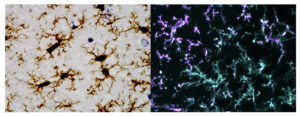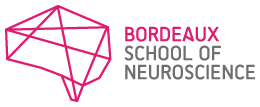Over the last 2 decades it has become abundantly clear that the brain mounts robust inflammatory responses, mediated locally by glial populations including microglia and astrocytes. As more and more data emerge from genome wide association studies of neurodegenerative and neuropsychiatric conditions it is evident that neuroinflammation is a key player in brain function and dysfunction. As a result there has been an explosion of interest in neuroinflammation and in the tools available to study these processes in the brain. Interrogating these pathways will be one of the key battlegrounds of 21st century neuroscience. To reach this challenging goal, expertise in neuroimmunology is necessary to identify the cellular and molecular mechanisms of neuroinflammation to understand how it participates in brain disease. This represents an exciting opportunity to potentially treat or even prevent neurodegenerative and neuropsychiatric disorders.
Neuroinflammation research relies on a large array of different techniques. Recently, there have been numerous advances in both the basic biological knowledge and the methodologies to study microglial cells and/or invading immune cells into the brain. This advanced course allows the students to obtain hands-on experience with techniques in both neuroscience and immunology, which are expected to be central to neuroinflammation research in the near future. Techniques include isolation and identification of cells contributing to cellular inflammatory responses, in vitro models, induced pluripotent stem cells (iPSCs), cellular imaging, fluorescence activated cell sorting (FACS), electrophysiology, biochemistry, qPCR, in vivo high resolution cellular imaging and bioinformatics. Rodent models will be the primary resource, with human iPSCs and brain material also available.
Directors & co-directors
- Colm Cunningham (Trinity College, Ireland)
- Sophie Layé (University of Bordeaux, France)
- Agnès Nadjar (University of Bordeaux, France)
- Andy Greenhalgh (University of Bordeaux, France)
Elena Avignone (University of Bordeaux, France)
Jimena Baleriola (University of the Basque Country, Spain)
Estibaliz Capetillo (University of the Basque Country, Spain)
Colm Cunningham (Trinity College, Ireland)
Xavier Fioramonti (INRA Bordeaux, France)
Diego Gomez-Nicola (University of Southampton, UK)
Andy Greenhalgh (University of Bordeaux, France)
Luke Healy (McGill University, Canada)
Ana Belen Lopez Rodriguez (Trinity College Dublin, Ireland)
Barry McColl (University of Edinburgh, UK)
Lydie Morel (INRA Bordeaux, France)
- Practical 1: Using flow cytometric cell sorting (FACS) for the identification and isolation of microglia and peripherally-derived immune cells in the CNS
- Practical 2: Gene expression analysis of isolated microglial and monocytic cells
- Practical 3: Applying transcriptomic approaches to understand microglial and neuroimmune function
- Practical 4: Distinguishing resident microglia from infiltrating monocytes
- Option 1: Preparation of microglia from human induced pluripotent stem cells (IPS)
- Option 2: Study of the effect of microglial activation on amyloid-induced synaptic dysfunction in Alzheimer’s disease in vitro model
- Option 3: Live 2-photon microscopic imaging of microglia
- Option 4: Immunohistochemistry – different preparations for different questions
- Option 5: Electrophysiology to study inflammation

Keynote speakers
Burkhard Becher (University of Zurich, Switzerland)
Robert Dantzer (MD Anderson Cancer Center, USA)
Ulrich Dirnagl (Charité Universitätsmedizin Berlin, Germany)
Britta Engelhardt (University of Bern, Switzerland)
Florent Ginhoux (A*STAR Agency for Science, Technology and Research, Singapore)
Diego Gomez-Nicola (University of Southampton, UK)
Barry McColl (University of Edinburgh, UK)
Trevor Owens (University of Southern Denmark, Denmark)
Hugh Perry (University of Southampton, UK)
Amanda Sierra (Achucarro Basque Center for Neuroscience, Spain)

